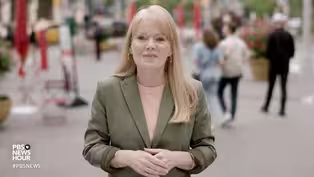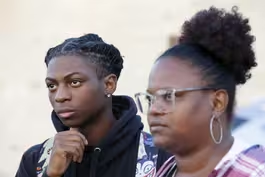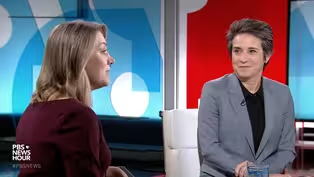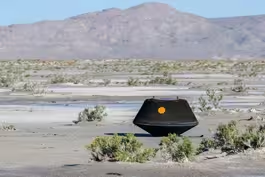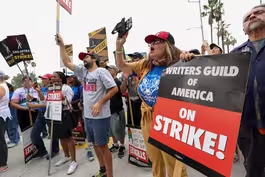
Biden hosts Pacific leaders in effort to counter China
Clip: 9/25/2023 | 6m 55sVideo has Closed Captions
Biden hosts Pacific Island leaders in latest effort to counter China's influence
President Biden hosted a gathering of Pacific Island leaders Monday that was equal parts about the U.S. growing its relationships and working to counter China’s power in the region. Biden promised the nations economic and climate-related help and dedicated a new U.S. Coast Guard mission. Lisa Desjardins discussed the tensions across the Pacific Rim with Zach Cooper.
Problems playing video? | Closed Captioning Feedback
Problems playing video? | Closed Captioning Feedback
Major corporate funding for the PBS News Hour is provided by BDO, BNSF, Consumer Cellular, American Cruise Lines, and Raymond James. Funding for the PBS NewsHour Weekend is provided by...

Biden hosts Pacific leaders in effort to counter China
Clip: 9/25/2023 | 6m 55sVideo has Closed Captions
President Biden hosted a gathering of Pacific Island leaders Monday that was equal parts about the U.S. growing its relationships and working to counter China’s power in the region. Biden promised the nations economic and climate-related help and dedicated a new U.S. Coast Guard mission. Lisa Desjardins discussed the tensions across the Pacific Rim with Zach Cooper.
Problems playing video? | Closed Captioning Feedback
How to Watch PBS News Hour
PBS News Hour is available to stream on pbs.org and the free PBS App, available on iPhone, Apple TV, Android TV, Android smartphones, Amazon Fire TV, Amazon Fire Tablet, Roku, Samsung Smart TV, and Vizio.
Providing Support for PBS.org
Learn Moreabout PBS online sponsorshipGEOFF BENNETT: In Washington today, President Biden hosted a gathering of Pacific Island leaders that was equal parts about the U.S. growing its relationship and working to counter China's power in the region.
Lisa Desjardins looks at the tensions across the Pacific Rim.
LISA DESJARDINS: We are talking about some of the most remote and most beautiful places in the world.
These 18 Pacific Island countries cover an area as vast as the entire continental United States, and they hold an increasingly important position the map, potential military and economic footholds, as the titans of Asia, especially China, wrestle for power.
At the White House today, President Joe Biden promised economic and climate-related help dedicating a new Coast Guard mission.
JOE BIDEN, President of the United States: The United States is committed to ensuring the Indo-Pacific region that is free, open, prosperous, and secure.
We're committed to working with all the nations around this table to achieve that goal.
So, this year, we shall send the first U.S. Coast Guard vessel solely dedicated to collaborate and train with Pacific Island nations.
LISA DESJARDINS: Among the many watching this closely is Zack Cooper with the American Enterprise Institute.
He also served in high-level security posts during the George W. Bush administration.
Zack, let's start with these nations.
They're in the middle of a global climate disaster and in between two world powers.
How do they see their predicament, and especially the tensions between the U.S. and China?
ZACK COOPER, American Enterprise Institute: Well, interestingly, the U.S. and China didn't really come up at all so far in the public statements.
In the joint statement between the United States and these Pacific Islands, China is not mentioned once.
It also didn't come up when President Biden made his opening remarks with the leader of the Cook Islands.
But it's certainly in the background here, because it's a concern for the United States, and it is a concern for some of the Pacific Islands that fear China's increasingly active political role in the Pacific.
But I think you're right to note that, at the end of the day, for a lot of these islands, what's more existential is the threat of climate change.
And so that's really probably priority number one for most of them.
LISA DESJARDINS: As you said, sort of a notable lack of mention of China throughout, at least so far, this meeting.
But can you talk about what does the U.S. need to do long term in this region?
What's the real concern?
And what does it need to be looking to do?
ZACK COOPER: There's several concerns from an American point of view.
I think one of them is the need for military access in the Pacific.
And anyone who remembers their World War II history will remember that, about 80 years ago this month, some of the worst fighting of World War II happened in the Pacific in these islands themselves.
And, once again, if there was a conflict in that region, those Pacific Islands and access in those islands would be critical.
And so the United States is looking to maintain access in some of them.
This is going to require, though, not just a military commitment from the United States, but a economic and a political commitment, because what the islands themselves want is additional development assistance and a real long-term commitment from Washington.
And so that's what President Biden is trying to sell on this several-day visit of the Pacific Island leaders to Washington.
LISA DESJARDINS: These are both obviously critical pillars here.
But, ultimately, for the United States, is this more of a military priority or an economic one?
ZACK COOPER: Well, let's be honest.
The Pacific Islands, although they're important, are just not a giant economic generator of GDP for the United States.
So, at the end of the day, I think a lot of Americans are going to think about the Pacific Islands maybe from a military standpoint before they think of it from an economic standpoint.
But this is the bargain, right?
The United States is looking for additional military access.
And, in exchange, many of the Pacific Islands, they want additional diplomatic recognition.
So the president today has recognized Cook Islands and Niue as two states for the first time.
They're looking for additional economic assistance and development assistance.
So the Peace Corps is reentering the Pacific now.
So, in some ways, you could say this is a bargain.
The United States is offering some degree of economic development and diplomatic assistance in exchange for the promise of military access if there is a contingency in the region.
LISA DESJARDINS: You mentioned that recognition of the Cook Islands and Niue, new signs of new relationships in this region.
However, at the same time, this summit has had a couple of setbacks, namely, the Solomon Islands is boycotting this.
They're developing a very close relationship to China.
And it's been a real issue for foreign policy for countries throughout that region.
How serious is that idea that at least one major player in the region does not want to be here?
ZACK COOPER: It definitely was a different disappointment for the Biden team.
They were hoping that leader of Solomon Islands would be there and present in Washington.
And I think the challenge for many of the Pacific Islanders is, they want to be united.
They want to show that the Pacific Islands are together in how they approach not just the United States, but China as well.
And so when one of the leaders doesn't show up to a fairly significant summit, that's a bit of a disappointment, not just for Washington, but for some of the other Pacific Islanders.
At the end of the day, I think what you're going to see is a variety of views across the Pacific, some countries leaning a little bit more towards Washington.
The United States has compacts of free association with three of the Pacific Islands.
Those islands really lean towards Washington.
And then Solomon Islands and maybe a couple of others are leaning a bit towards China.
And the challenge for the islanders is to manage this dynamic without having a fracture among the Pacific Islands.
And that's going to be a challenge going forward.
LISA DESJARDINS: In just our last couple of seconds, a quick question about U.S. leadership.
You mentioned those compacts we have.
Three of those island nations depend on the U.S. for things like mail.
But we're heading into a possible government shutdown.
And that could be cut off.
Just quickly, do you think, is there a question about U.S. government leadership and stability because of what's happening here in Washington now?
ZACK COOPER: Absolutely.
So, in May, the president had to skip meeting almost all of these leaders in Papua New Guinea because he had to worry about the debt shutdown, the debt crisis.
And now we're talking about a government shutdown just a couple of days after they leave.
So, what many of these leaders want is sustained commitment.
And this is going to be a concern for them going forward.
LISA DESJARDINS: Zack Cooper, thank you so much for joining us.
ZACK COOPER: Thanks for having me.
A Brief But Spectacular take on finding your voice
Video has Closed Captions
Clip: 9/25/2023 | 3m 9s | A Brief But Spectacular take on finding your voice (3m 9s)
Family of Black teen suspended for hair sues Texas leaders
Video has Closed Captions
Clip: 9/25/2023 | 4m 39s | Family of Black teen suspended from school for his hairstyle sues Texas leaders (4m 39s)
Sheila Johnson on her new memoir 'Walk Through Fire'
Video has Closed Captions
Clip: 9/25/2023 | 9m 8s | Sheila Johnson discusses her groundbreaking career and new memoir 'Walk Through Fire' (9m 8s)
Tamara Keith and Amy Walter on government shutdown impacts
Video has Closed Captions
Clip: 9/25/2023 | 9m 46s | Tamara Keith and Amy Walter on the economic and political impact of a government shutdown (9m 46s)
What scientists hope to learn from asteroid sample
Video has Closed Captions
Clip: 9/25/2023 | 7m 52s | What scientists hope to learn from asteroid sample returned to Earth on NASA spacecraft (7m 52s)
What's next after writers reach tentative deal to end strike
Video has Closed Captions
Clip: 9/25/2023 | 7m 51s | What's next for Hollywood after writers and studios reach tentative deal to end strike (7m 51s)
Providing Support for PBS.org
Learn Moreabout PBS online sponsorship
- News and Public Affairs

FRONTLINE is investigative journalism that questions, explains and changes our world.

- News and Public Affairs

BREAKING the DEADLOCK sparks bold, civil debate on America’s toughest issues.












Support for PBS provided by:
Major corporate funding for the PBS News Hour is provided by BDO, BNSF, Consumer Cellular, American Cruise Lines, and Raymond James. Funding for the PBS NewsHour Weekend is provided by...
